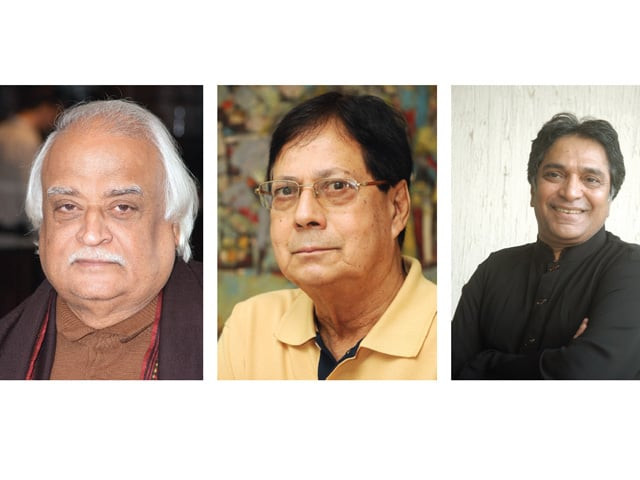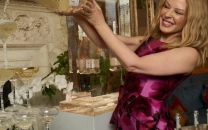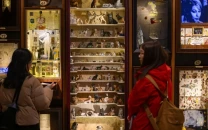Pakistan's comedians: Riot act
Remembering the genius of Anwar Maqsood, Omar Sharif and others - they don't make comedians like they used to.

Pakistan's comedians: Riot act
And so, Nanha takes position in front of a bus stop, clad in a torn kurta and with bandages adorning his face, loudly proclaiming, “Jo de us ka Allah bhala karay, jo na de us ka fittay munh.” He proceeds to mistake a man’s wife for his daughter and another man’s daughter for his wife and gets taunted, shoved and slapped in the process. When all else fails, he decides to beg as a woman, from under the shroud of a burqa. The hilarity comes to an end in typical “Alif Noon” fashion — with people crowding around Nanha and beating him up.
The episode is a laugh riot mainly because of Nanha’s antics but it also pushes all the right buttons. It pinpoints begging, a problem that existed in Pakistan back in the 60s and continues to do so even now. In the beginning, the two friends are shown sitting together, criticising the beggars that approach them. But then, “Alif Noon” is a comedy and the moral discussion is quickly wrapped up and the plot becomes side-splittingly funny. After all, nothing tickles the jocular vein more than a sensitive satire of something that would normally make us feel very sad.
Many of Pakistan’s best comic shows have run along similar lines: tongue-in-cheek, perceptive satires of society. It’s only in recent times, with the influx of media channels and the growing influence of Bollywood, that we have had to put up with comedians delivering jokes in a Jonny Lever-inspired slapstick style. Their jokes are usually repetitive, often forgettable and borderline vulgar. We may laugh initially but really, the Pakistani audience, over the years, has been bred on a much more refined, intelligent brand of comedy.
A case in point is another drama from the 60s: Khawaja Moinuddin’s “Taleem-e-Balighan”. The long play focuses on an unruly group of adults being taught by an aged, scurrilous, impoverished master sahib (Mahmood Ali). The cast features some of Pakistan’s finest actors, including Qazi Wajid, Subhani Ba Younis and Qasim Jalali playing the roles of the wayward student body to the hilt. Master sahib enthusiastically beats up his students with his stick; his wife shouts out insults from inside the house since she can’t venture in front of ‘ghaair mard’; the butcher, who is also the class prefect, waves his knife in front of master sahib when aggravated. But amidst the nonsensical hilarity, “Taleem-e-Balighan” has a very clever script, with master sahib making frequent acerbic references to a number of issues like sectarian prejudice, illiteracy, corrupt government officials and poverty. Here’s an example: when the milkman enters, master sahib asks him why yesterday’s milk was so much better than the usual supply, to which he naively replies, “Master sahib, kal paani ke nalkay bund thay” (the water taps were closed yesterday). There are a great deal of insinuations in this play, cloaked in the guise of comedy.
As far as insinuations go, though, nobody is better at making covert wisecracks than Anwar Maqsood. In some of his most memorable work, Anwar Maqsood has teamed up with comedian Moin Akhtar and conducted uproarious, sharp-witted question-and-answer sessions. Moin Akhtar is a marvel at impersonations — in the most recent of these ventures, “Loose Talk”, he starred in almost 245 episodes masquerading as a bullied husband, a Bengali baba, an Indian poet, a corrupt police official and an unscrupulous chaudhary sahib amongst other characters. Maqsood, as the interviewer, furrowed his brows and solemnly tried to make sense of the belligerent answers given by Akhtar’s character.
The script was funny but Maqsood’s work almost always includes astute, well-constructed critiques of current happenings. Shows like “Fifty Fifty”, “Show Time”, “Aangan Terha”, “Half Plate”, “Studio Dhai” and the “Silver Jubilee Show” are icons in Pakistani comic history. While these programmes showcased some rollicking instances of slapstick comedy, they also included a healthy dose of Anwar Maqsood’s signature sugarcoated sarcasm. “Studio Dhai”, another Anwar Maqsood-Moin Akhtar interview-based show, actually got banned for its bold script. One sequence from “Fifty Fifty”, the highly popular comedy skit show dating back to the 80s, pokes fun at the very Pakistani urge to converse in English even though we may be terrible. Called Bashira in Trouble, it is allegedly the first Punjabi movie in English, claiming that the actors took “six month-long language training courses” for the movie. The skit begins with Bashira daku bradnishing a gun at Ismail Tara, at which Tara raises his eyebrows and says in a deep Punjabi baritone, “Tach me nat Bashiriya.” And then, in another scene, Bashira’s girlfriend, played by Bushra Ansari, tells him he’s a liar at which he exclaims, “Jast you shut up.” “Fifty Fifty”, incidentally, brought some of Pakistan’s most prolific comedians to the forefront: Ismail Tara, Zeba Shehnaz and Bushra Ansari, with her uproarious impersonations of Salma Agha, Tahira Syed and Madam Nur Jehan.
Another writer who ruled PTV back in the 80s, is Hasina Moin. The dramas penned by Hasina Moin were mainly romances, with glossy, affluent characters cavorting around the city, running along the beach and carelessly dressed in Tee-jays (Pakistan’s one and only ‘fashionable’ boutique back then). Her dramas were always pure, unadulterated entertainment, the comic sequences cleverly woven into her stories with such expertise that they rendered her characters all the more lovable and unforgettable. In one scene from “Ankahi”, the heroine Sana, staples her boss’ tie to some important papers in her new secretarial job. Incidentally, that particularly scene has been replicated in quite a few Indian movies, where Hasina Moin’s happy-go-lucky concoctions are apparently quite popular.
Omer Sharif is another Pakistani comedian who has a large number of fans across the border, From his first foray onto the stage back in the late 70s, to his various ventures in movies and television talk shows, Sharif has time and again proven himself to be a comic genius. A lot of his jokes are completely spontaneous and at any given time, he will have impromptu impersonations, song parodies and jokes up his sleeve. His jokes may be audacious, but he is careful to sugarcoat them, and somehow, nobody gets insulted. Whether playing the role of a libidinous scientist in a stage drama or hosting a prestigious Bollywood awards function or interviewing a famous politician, he knows exactly how to get the crowd rolling in the aisles. In a talk show that he is presently hosting, I have watched Omer Sharif brazenly grill his celebrated guests only to have them answer smilingly. Amongst others, Mustafa Khar unabashedly answered questions regarding his multiple marriages, Sharmila Farooqi spoke frankly about her time in prison and Arif Lohar only laughed at pointed remarks about his weight. A large number of the comedians currently gracing our TV screens honed their talents under Omer Sharif’s tutelage. Performers like Shakeel Siddiqui, Rauf Lala and Sikander Sanam began their careers with Omer Sharif’s stage plays and have now been able to establish fan followings of their own.
There are many other comedians who have, time after time, made us laugh. Munawwar Zareef, with his comic timing, facial expressions and spontaneity, is one of the forerunners of Pakistani comedy. His movies, dating back to the 50s, are still a rollicking treat. And then there’s Athar Shah Khan, who gave us the goofy Jaidi in the 60s. Bushra Ansari continues to delve in comedy. She recently wrote the drama “Dolly ki Aayegi Baraat”, in which she also took on the hilarious role of a temperamental, make-up laden Faisalabadi woman with a promiscuous Chaudhary husband. Azfar Ali’s drama series, “Sub Set Hai”, portraying the cataclysmic lives of a group of Karachi-based teenagers drew in quite a few guffaws — as do Jawad Bashir and Faisal Qureshi’s occasional ventures.
A modern-day development in the realm of Pakistani comedy has been the entry of stand-up comedians who usually perform in English in front of live audiences. They sing, sometimes dance, stand on stage for an entire hour and coax the audience into laughter. The improvisational comic troupe, Blackfish, ruled the roost for some time. Now, the troupe’s creator, Saad Haroon, has launched out on his own, performing in major cities, often along with fellow comedian Danish Ali.
Still, it is the older lot of comedians that we recall most fondly and that we want to watch again and again. Quite often, I hear comedians delivering Omer Sharif’s jokes, passing them off as their own. I once asked Omer Sharif about this outright plagiarism. He just shrugged. “People recognise the jokes as my own, even if somebody else is delivering them. These comedians are passing up the opportunity to build their careers by plagiarising. I’ll just come up with more fresh material — what will they do when they run out of jokes to copy?”
They just don’t make comedians like that anymore.
Published in The Express Tribune, November 7th, 2010.



















COMMENTS
Comments are moderated and generally will be posted if they are on-topic and not abusive.
For more information, please see our Comments FAQ